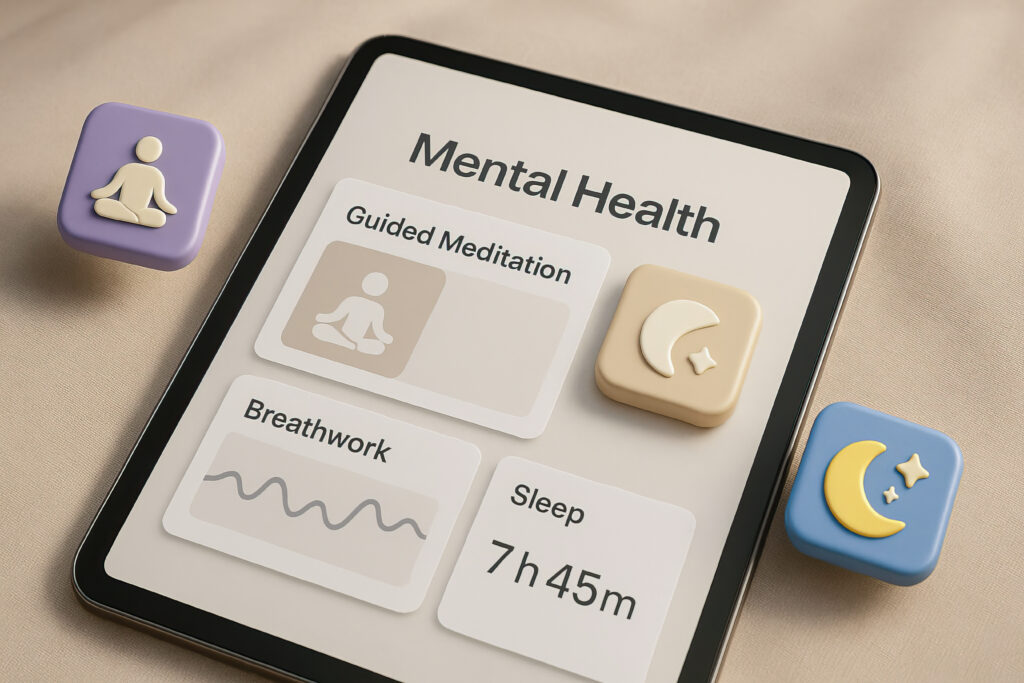Sustainable Mental Health Solutions for Doctors

With rising levels of burnout, widespread staffing shortages, and growing demands on clinical teams, mental health support for doctors is no longer a topic of the future—it is an urgent need of the present. The well-being of medical professionals is under unprecedented strain. More than ever, hospitals, policymakers, and every medical recruitment company must recognize the urgent need to prioritize the mental health of physicians as a cornerstone of effective care delivery.
Findings from a recently published Mayo Clinic Proceedings report reveals that burnout among US physicians has been improving and is currently at levels similar to 2017. However, US physicians remain at higher risk relative to other US workers. As of 2023, 45% of physicians reported experiencing at least one symptom of burnout, with the highest rates among emergency medicine, family medicine, and internal medicine providers. While this marks a modest improvement from the peak levels seen during the COVID-19 pandemic, the numbers remain troubling. Emotional exhaustion, depersonalization, and work overload continue to take a toll on healthcare worker stress. Despite increased awareness, structural barriers, including limited access to care and stigma, still prevent many physicians from seeking the support they need. Addressing these challenges requires coordinated action from health systems, policymakers and workforce partners alike.

The Hidden Toll: Healthcare Worker Stress and Burnout
The mental health crisis among healthcare workers is multifaceted. Long shifts, traumatic patient interactions, administrative overload, and understaffed teams all contribute to chronic stress.
Physicians are especially vulnerable. The emotional and physical weight of patient care, compounded by high expectations and minimal margin for error, often leads to a state of burnout in healthcare that can impact performance, patient safety, and quality of life. Frontline nurses, locum tenens professionals, and support staff face similar stressors, especially when moving between assignments or dealing with understaffed facilities.
Why Doctors Don’t Seek Mental Health Support
Despite the widespread need, many practitioners remain hesitant to seek mental health support due to deeply rooted fears and logistical barriers.
-
Licensing Concerns
Roughly 40% of physicians, as well as medical school students and residents, cite fear of disclosure requirements on licensure forms as a main reason why they don’t seek mental health care. The American Medical Association (AMA) has been working to debunk myths around these requirements and partnering with other groups to advocate for changes to legislation and regulations.
-
Confidentiality Limitations
Access to confidential, stigma-free care remains uneven, especially in rural areas or small practices where anonymity is limited.
-
Financial and Time Constraints
The demanding nature of the job makes scheduling therapy or support services difficult. Many physicians lack insurance coverage for behavioral health or work in environments without integrated care access.
Sustainable Solutions to Support Doctors’ Mental Health
1. Establish a Culture of Psychological Safety in Healthcare Settings
The first step in building sustainable solutions is addressing culture. Culture plays a critical role in both creating and solving the problem. The negative mindset around practitioners seeking mental health support is shifting as leaders are beginning to understand that fostering psychological safety in healthcare—where practitioners feel safe to express concerns, admit challenges, and access help without fear of punishment—is essential to long-term sustainability. To this end, some organizations are embedding mental health resources into the fabric of their workplaces:
- Making mental health check-ins part of onboarding processes
- Offering annual mental wellness trainings alongside compliance requirements
- Promoting manager training on recognizing signs of burnout and providing support.
These initiatives are credited not only with reducing turnover, but they also signal that wellness strategies for physicians are a shared responsibility not an individual burden.
2. Promote Wellness Strategies for Physicians
Another effective way to counter physician burnout is to implement concrete strategies to support physician wellness across career stages and specialties, as many organizations are beginning to do.
Offering Peer Support Groups and Mentorship Programs
The power of peer support in reducing healthcare worker stress cannot be overstated. Structured peer-to-peer programs offer clinicians a safe space to share experiences, validate emotional struggles, and learn from one another. These programs often include facilitated conversations, mentorship from senior clinicians, and peer listening training to help staff support their colleagues more effectively.
For early-career physicians, especially those navigating demanding residencies or new leadership roles, peer groups can be instrumental in easing feelings of isolation and building resilience. When peer support becomes part of the institutional culture, it helps physicians see that asking for help is a strength, not a weakness.
Embedding Behavioral Health Professionals in Clinical Teams
Some hospitals are taking a proactive approach by integrating licensed behavioral health clinicians, such as psychologists, social workers, or wellness coaches, directly into clinical departments. These embedded professionals provide real-time emotional support, lead debriefing sessions, and assist with early intervention when signs of burnout or trauma appear.
This model normalizes mental health care by making it as routine and accessible as other forms of professional support. It also aligns with broader efforts to build psychological safety in healthcare, where staff feel safe discussing stress, fatigue, or emotional challenges without fear of retribution or judgment.
Adopting Mindfulness and Self-Regulation Tools for Physicians
From meditation apps like Headspace and Calm to evidence-based cognitive behavioral tools like Moodfit and Happify, digital wellness resources can help doctors incorporate mental health support into their daily routines. Hospitals are also offering on-site mindfulness workshops, guided breathing sessions, and resilience training tailored to clinicians’ specific stress profiles.
Personalizing self-care techniques is especially effective because they’re flexible, scalable, and can be integrated into even the busiest physician schedules. Many programs also focus on self-regulation techniques such as heart-rate variability monitoring, journaling, and stress inoculation, all of which can increase emotional control in high-pressure situations.
Learning How to Build Wellness into Healthcare Workflows and Culture
Perhaps the most important strategy is designing workflows and institutional structures that support wellness by default, not just as a crisis response. That includes ensuring adequate rest periods, encouraging PTO use, providing flexible schedules where possible, and avoiding glorification of overwork.
Workforce planning is critical here. Staffing models that rely heavily on overtime or spread clinicians too thin contribute directly to burnout. By partnering with a medical recruitment company or working closely with a physician recruiter, healthcare organizations can alleviate pressure points and create more sustainable schedules, reducing turnover by protecting the well-being of those already in place.
The goal of these initiatives isn’t to expect physicians to become their own therapists. Rather, it’s to ensure they have access to timely, tailored, and confidential support that fits within the fast-paced reality of clinical practice. When mental wellness is woven into the fabric of healthcare operations, physicians are empowered to thrive in their roles.
Offering Telehealth-Based Therapy for Healthcare Professionals
Confidentiality, stigma, and scheduling challenges often prevent doctors from seeking traditional therapy. However, telehealth-based mental health platforms specifically tailored to physicians have emerged as a potential game-changer. In fact, a 2024 study concluded that telehealth is an effective form of therapy for countering physician burnout.
Services like The Emotional PPE Project and Project Parachute offer free or low-cost virtual therapy sessions with providers who understand the emotional demands of clinical care. These platforms allow physicians to access mental health services privately, on their own time without fear of being judged by colleagues or jeopardizing their medical license.
Incorporating teletherapy into institutional wellness programs also ensures clinicians can access immediate care during high-stress periods, such as after patient loss or major procedural complications.
3. Optimize Healthcare Staffing, Workforce Planning, and Recruitment
You can’t fix physician burnout without fixing the workforce. Healthcare staffing shortages are one of the most significant contributors to clinician stress, especially in high-demand specialties and underserved areas. When hospitals operate under chronic shortages, physicians are left with:
- Unmanageable patient loads
- Inconsistent support teams
- Compromised time for documentation and reflection.
Physician recruiters and medical recruitment companies are increasingly part of the solution. By helping organizations anticipate workforce needs, fill locum tenens gaps, and build sustainable staffing models, they reduce unnecessary strain on core teams.
A New Era of Mental Health Support for Doctors
The need for robust, accessible, and stigma-free mental health support for doctors has never been clearer. From rising rates of burnout to growing concerns around psychological safety in healthcare workplaces, it’s evident that physicians are struggling under the weight of increasing clinical, administrative, and emotional demands.
There are multiple layers contributing to the crisis—from systemic barriers and cultural stigma to overwhelming healthcare staffing shortages. Fortunately, there’s also a range of actionable wellness strategies for physicians, including telehealth counseling, peer support networks, and embedding behavioral health into daily workflows.
However, strategies alone aren’t enough. Healthcare systems must evolve, and that includes recognizing how workforce planning plays a critical role. Partnering with a medical recruitment company or physician recruiter can help reduce the burden on overextended teams by ensuring appropriate staffing levels and integrating mental health considerations into scheduling and role design.
Ultimately, a healthier workforce leads to better patient outcomes, lower turnover, and stronger, more resilient healthcare institutions. By investing in mental health for physicians and reshaping our approach to care delivery, we can build a future where doctors are equipped not only to treat others, but to thrive themselves.




